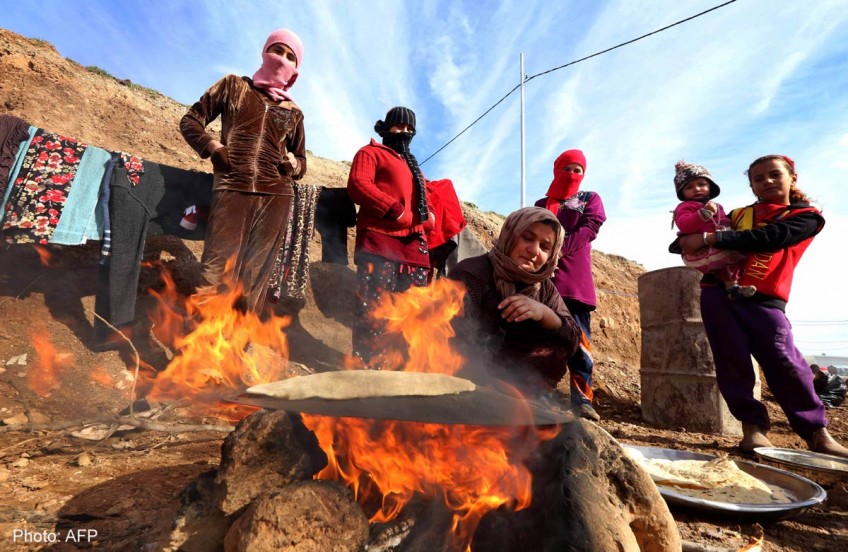Rights abuses, Western powers fuelled rise of Islamic militants: HRW

WASHINGTON - Governments increasingly view human rights as "a luxury" they can ill afford, Human Rights Watch said Thursday, warning that abuses fuel crises in world trouble spots like Syria and Ukraine.
Western powers, including the United States, are far from blameless and in some cases their wrongdoing has fed the very climate in which serial rights abusers like Islamic State jihadists thrive.
"Human rights violations played a major role in spawning or aggravating most of today's crises," argued Kenneth Roth, director of the US-based watchdog, as HRW unveiled its annual report.
Even as it seems that "the world is unravelling," he warned, many governments "appear to have concluded that today's serious security threats must take precedence over human rights."
"In this difficult moment, they seem to argue, human rights must be put on the back burner, a luxury for less trying times," Roth said, introducing the 660-page HRW World Report 2015.
Such a calculation is false, Roth insisted.
Instead, he argued that "human rights are an essential compass for political action" and shelving them is "not only wrong, but also shortsighted and counterproductive."
From Iraq to Syria, Egypt, Nigeria and Ukraine "protecting human rights and enabling people to have a say in how their governments address the crises will be key to their resolution."
The emergence of the Islamic State group was in part fuelled by the 2003 US-led invasion of Iraq.
This led to a security vacuum and well-documented abuses in Abu Ghraib prison and the US military jail at Guantanamo Bay.
Later the United States and Britain "largely shut their eyes" to the sectarian policies of Shiite prime minister Nuri al-Maliki and his persecution of the Sunni minority, and even continued to ply his government with arms.
In Syria, the US cobbled together a 60-strong coalition to combat the IS jihadists, but no nations have stepped up pressure on Syrian President Bashar al- Assad "to stop the slaughter of civilians."
"This selective concern has been a gift to ISIS recruiters, who portray themselves as the only ones willing and able to stand up to Assad's atrocities," said Roth.
This same selectivity has been shown in Egypt, where the global response to "unprecedented repression" by general-turned-president, Abdel Fattah al-Sisi, has been "shamefully inadequate."
'Good-versus-bad mentality'
Washington shied away from denouncing the Egyptian military's overthrow of elected Islamist president Mohamed Morsi a coup.
In this, it was driven by its own concerns for the security of the unruly Sinai peninsula and neighbouring US-ally Israel.
Support for the Sisi leadership is "a disaster for the Egyptian hopes of a democratic future" and sends "an appalling message to the region."
"ISIS can now credibly argue that violence is the only path to power for Islamists because when they sought power through fair elections and won, they were ousted with little international protest," Roth said.
Human rights abuses in Russia, which stifled critical voices inside the country over the past two years, and the West's "relatively narrow reaction ... may well have aggravated the Ukrainian crisis."
Yet, the West has also fallen back on "a good-versus-bad mentality" and in its desire to show Ukraine as a victim of Russian aggression has been "reluctant to address Ukrainian abuses."
The need for security in the digital age has also triggered concerns for Human Rights Watch, alarmed by daily data snooping by governments targeting hundreds of millions of people.
"Governments everywhere are expanding their own mass surveillance capacity," argued senior HRW Internet researcher Cynthia Wong.
The United States and Britain remain the leaders in the field, having "thrown away any notion of proportionality."
Wong said the transatlantic allies "have provided a roadmap for governments of all political persuasions to build their own systems of mass surveillance."
With few privacy protections built in, she warned, "a truly Orwellian scenario could unfold."
A further HRW concern the trampling of human rights during mega-sporting events such as the Sochi Winter Olympics, when Moscow cracked down on civil society and journalists.
The fact that only Kazakhstan and China -- both with terrible rights records -- are in the running for the 2022 Winter Olympics, "should be keeping the IOC up at night," the report says.
It proposed the International Olympics Committee build human rights monitoring into the hosting process in the same way "as they now do to build ski jumps, swimming pools and equestrian facilities on time."